Out of Control, Part 2 (Journey to India)
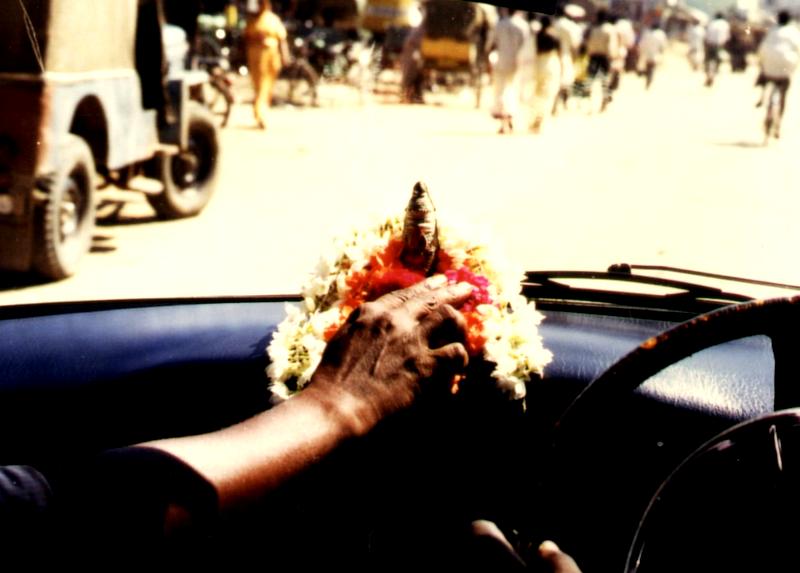
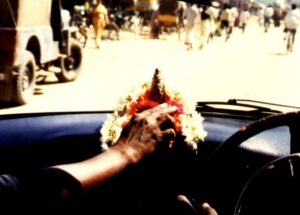 We grabbed our carry-ons and sprinted to the ticket counter. Our plane had just left, but the British Air agent found us seats on a different airline.
We grabbed our carry-ons and sprinted to the ticket counter. Our plane had just left, but the British Air agent found us seats on a different airline.
“You’d better hurry,” she said. “It boards in a few minutes. Your luggage will be sent to Madras. Run.”
We ran through long gray crowded hallways. My pack smacked against my back with each stride. I was exhausted and weepy and wanted to go home. I suppose I could have surrendered, but I didn’t know how. Vic squeezed my hand as we boarded the flight just before the doors closed. He loved an adventure.
In London, we caught up with our London-Madras (Chennai) flight. As we boarded the plane, I took deep belly breaths to calm down for a 15 hour flight.
***
The Madras airport was small for a city of four million. We stood at the carousel, listened to the squealing conveyor belt, and watched people grab their luggage.
 “Our luggage isn’t here,” we told the airport manager.
“Our luggage isn’t here,” we told the airport manager.
He smiled and shook his chin side to side in what we came to call the “Tamil Nod.” Was it yes? Was it no? Was it maybe?
“Oh, so sorry,” he said, nodding away. “Your luggage will be on the next flight from London.”
“When is that?”
“Friday,” he said with a nod. It was Sunday. No water purification tablets. No summer clothes. No organic dried fruit as a gift for the Hindu sage we’d come to honor.
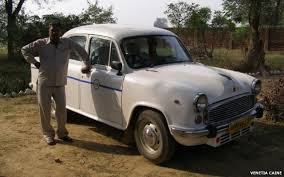 “We have a clothing allowance courtesy of British Air,” the airport manager said with another Tamil nod. We took our rupees and looked for a cab. On the two hour drive from Madras to Kanchipuram, the cab belched smoke and groaned. No seatbelts, of course. The driver had a dashboard altar with a statue and fresh flowers. I hoped his god had power.
“We have a clothing allowance courtesy of British Air,” the airport manager said with another Tamil nod. We took our rupees and looked for a cab. On the two hour drive from Madras to Kanchipuram, the cab belched smoke and groaned. No seatbelts, of course. The driver had a dashboard altar with a statue and fresh flowers. I hoped his god had power.
Vic was in the front seat, flinching as his body bounced up, down, and sideways. The rest of us cringed in the backseat as the cab swerved around cows, honked at rickshaw drivers, and swung into the on-coming lane, missing approaching cars by inches.

After sunset, we walked into the Tamil Nadu Hotel, shaken, exhausted, and sweating in winter clothes in 90 degree humidity. It was the best hotel in town, but Harriet pointed to the dark streak of men’s hair grease on the wall behind a bench. She grinned.
The man at the desk smiled and gave us the nod and keys. The dark hotel room had windows above eye level, a ceiling fan, and a promising tile bathroom, but nothing happened when we turned the faucet.
“Water will be OK tomorrow,” the clerk said with that reassuring nod.
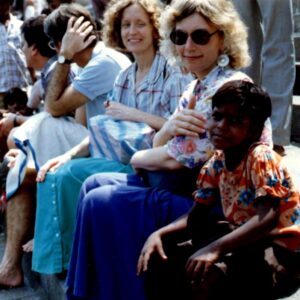
I stripped off my grimy clothes and slept a few hours. At 4 am, Vic and I took a lukewarm shower together, fearing the water would go out any minute. We put on corduroy pants and smelly long sleeve shirts and met our friends outside. This wasn’t the way we wanted to present ourselves to the sage, but we were here.
***
The first part of this journey was posted on August 16, 2022: Out of Control, Part 1. I’ll continue the story next time. It was a spiritual initiation like no other, complete with chaos, humor, deep peace, and a demolished ego. My first experience of Hindu ritual was in the mid 1970s at an ashram led by a woman teacher Gayatri Devi. I wrote about that experience in A Spiritual Path with Heart.

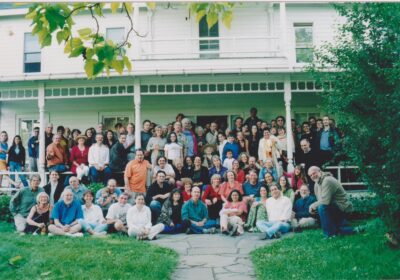
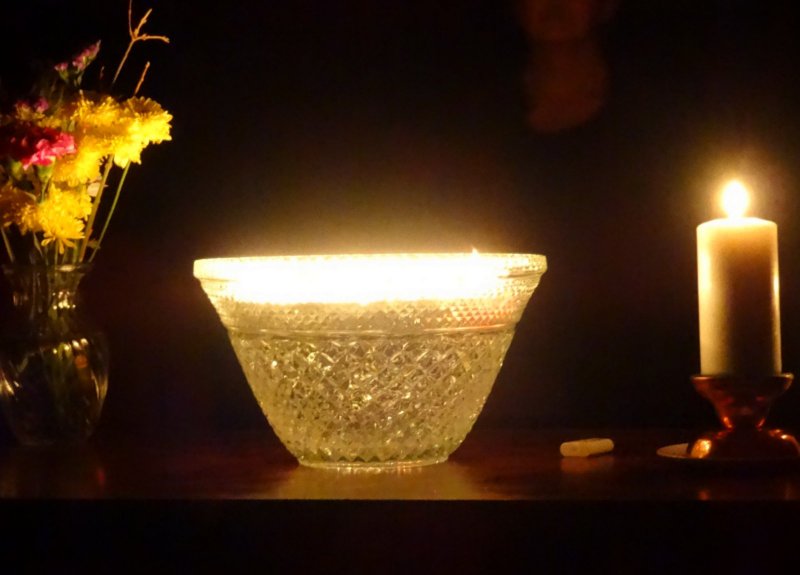
September 12, 2022 at 1:18 pm
anne
Dear Elaine,
I have loved the first two installments of your Journey to India and am eagerly awaiting the next! In response to your question in Part 1, ““Do you have a trip that began like the trip from hell but ended up being heavenly?”, I ended up writing a treatise (because there was so much craziness) on a trip to Chile I took almost 7 years ago, but my Internet went out before I finished, which probably was a good thing since I think I was mostly processing my trauma.
Part 2 brought back in vivid detail my arrival in Mumbai 10 years ago and the sense that I had truly entered a different world. I was unbelievably fortunate to have my daughter greet me outside the airport — finding her face in a sea of people, rickshaws, and more sensory information than I had ever experienced is one of my most cherished memories.
I especially loved what you wrote, “It was a spiritual initiation like no other, complete with chaos, humor, deep peace, and a demolished ego.” Pretty sure a demolished ego is a requirement for the kind of initiation you experienced.
Sending love, Anne
September 14, 2022 at 9:41 am
Elaine Mansfield
Thanks for your comment, Anne. When we were in Mumbai on the way back to the US on one of the three journeys, the city was engulfed in conflict between Muslims and Hindus. From the top of the hotel, we saw fires in every direction.
I wish your daughter had been there to great us at the airport in Madras. The sensory input was overwhelming and confusing. Where am I? I hope your writing about Chile wasn’t lost because the internet “went out.” I hope you had good back-ups and will return to that experience one day. There’s plenty to learn in looking back. Our third trip to India in 1994 was the least harrowing in outer ways, but the most inwardly transformative. I’ll write about that soon. Love to you, too.
September 5, 2022 at 5:57 am
Aladin Fazel
You know what? I am happy you both loved adventures! Although These things are not so strange to me, I can imagine your excitement. Lovely story; I can hardly wait for the third part.
September 5, 2022 at 11:19 am
Elaine Mansfield
I loved adventures with Vic, but haven’t done much traveling since his death. (My wildest adventure? When I was 6 1/2 months pregnant, we hiked for a week in the highest parts of the Rocky Mountains, trusting in my Mexican Midwife Manual. Thank the Goddess, I didn’t go into labor a full days hike from the nearest mountain train.)
September 4, 2022 at 4:42 pm
Jean Raffa
I’m enjoying this so much, Elaine. It brings back memories of our travels through much of Asia, all of which were enriching, enlarging, eye-opening, and spiritually meaningful! And, of course, humbling! Like the time Fred and I hiked up a mountain through rice paddies in the Annapurna range, arrived at our remote and rustic refuge, changed for dinner, and Fred had a leech on his chest! Several others with us had them too. Thankfully, I was spared. But we did get to take a warm shower. Unfortunately, by the time the last ones in our group arrived, the water was cold. Or the night we spent in a tent camp in the Sahara desert in Morocco, and it rained all day and night. First time it had rained there in many years. We loved India. And oh my, how I loved the beautiful, gentle elephants, although they did not make for the most comfortable rides. It certainly was an assault on our senses, both in good and not so good ways, but the poverty was heartbreaking.The thing I loved most about these Asian trips was the people. Everyone was so kind and gentle and accepting and respectful compared to Europeans. And very spiritual. Everywhere we went we saw beautiful altars—some large, some very small—with statues of gods and goddesses and flowers and fruit and sweet smelling spices and colorful scarves. The one thing I regret about these trips is that we never went to an Ashram. Fred’s not a fan of meditation. He could never sit still that long! I envy you that experience!
September 5, 2022 at 11:13 am
Elaine Mansfield
India was a life changer for me, especially the third trip. At some point I might skip to the final days there which were so powerful. You had exciting India trips and, I imagine, nicer hotels and taxis. We went to see two spiritual lights (Sankaracharya, head of South Indian Hinduism) and the Dalai Lama) so only took a few nature trips, but nature came to us. Dharmsala was populated with monkeys as well as humans. In south India, we got to know the temple elephants and their trainers well, especially on our last trip. They visited the sage every morning for fruit offerings and felt like part of the spiritual family as well as representatives of the god Ganesh. We sometimes went to the elephant quarters earlier in the morning to watch the bathing and elephant painting in preparation for the day’s ritual. I loved the affectionate relationships with the men who tended them. (It all feels like another lifetime.) We were treated well by people in India, but there were many cold showers and flat tires. I loved staying in one modest hotel, walking to the temple before daybreak, shopping at the local market for vegetables the hotel cook would prepare, and meditating with the sage. In the midst of chaos, my mind and heart became peaceful and quiet.
August 31, 2022 at 12:04 pm
Marian Beaman
The stakes get even higher in this installment, Elaine. Living in a First World country, we often take for granted the value of pure water and constant electrical currents.
What a story you get to tell: Vic’s voice of reason still resonates here. And you narrate it in such vivid detail. I too am often the weaker one, having married a different version of “Adventure” as you well know.
Thanks for sharing once again! 😀
August 31, 2022 at 12:52 pm
Elaine Mansfield
Pure water? Constant electricity? Taxis without flat tires? Things may be different in India now in the age of computers. Maybe everyone has a generator. Vic loved an adventure and if things went off the tracks, he had fun making that OK while I fought back tears and felt a sense of doom. Vic was wonderful in that way and a relaxed traveler while being (mostly) tolerant about my concerns. I was a nervous wreck about the small stuff like toothpaste and the right gifts, as though the wise man cared. People brought fruit and much more which he passed on as prasad or blessed food to those in need and also to the temple elephants. I learned later that he enjoyed the organic dried fruit I’d brought which we gave him after our luggage arrived. It finally arrived and Vic and Michael had another adventure retrieving it. I love that you’re writing with Cliff and I’d never call you the “weaker” one.
August 31, 2022 at 6:17 am
susan scott
oooooh, I felt it all Elaine! This was a demolishment de luxe. I much look forward to part 3. I’m reminded again that out of chaos comes order (or so I like to believe) and that from order, chaos. I suspect I may have perished at the thought of no clothes etc until the next London flight, in several days ….
As we say here in SA, ‘n boere maak ‘n plan’ – translated, a farmer makes a plan. Maybe those would have been my first thoughts on hearing that my luggage was lost, to be retrieved several days later and being in winter gear in hot humidity – ‘n boere maak ‘n plan. Maybe a realisation that everything was now totally out of my hands and there was nothing to do but hope for the best …
Your photos accompanying your story are lovely!
August 31, 2022 at 12:41 pm
Elaine Mansfield
Susan, there are so many parts to this story, and I don’t know how long I’ll continue writing about India. It was an ego demolishment before we even stood in front of the sage and introduced ourselves without a gift or flowers to offer him. After the first day, we were taken to the clothing district in a rickshaw which was another comic journey. I’ll share the adventures trying to get clothes that fit, especially for the men. We were so odd in India that maybe no one noticed our strange clothing. We soon found the flower stands on the streets and offered flowers or fruit every day. Yes, a farmer has plans and they have to be tossed when they are unworkable. The photos are a mix of all 3 trips because our camera malfunctioned (of course) on the first trip. Another friend who was there shared some of her photos and I gave her photo credit.
August 30, 2022 at 8:09 pm
Myra
Beautiful and exciting – a real cliffhanger! I loved reading your descriptive memory of Mataji (Gayatri Devi) and the Cohasset Ashram in the link at the end! How sweet that her influence through you may have softened the austerity of meditation at the Center. Thank you!
August 31, 2022 at 12:28 pm
Elaine Mansfield
That was an important conversation for me, Myra–and it seemed a little bold. As much as I loved meditating with Anthony, his early approach felt austere and didn’t quite touch my heart. I was grateful when he added more music and readings. I don’t know how much our conversation changed Anthony’s teaching of meditation, but it was important for me to figure out what worked for me. (It’s a big loss that I can’t hear music now, but memory holds on to some of it.) Thanks for your comment and bringing back memories of Mataji.
August 30, 2022 at 12:47 pm
Deborah Gregory
Wonderful Elaine! I really enjoyed reading this second instalment of your awakening journey to India! Thank you so much for sharing your photos as well as including all those little details … the belly breaths, those Tamil nods and that grease on the wall.
I’ve never travelled to India myself but reading between the lines as poets do, it feels like India is an assault on all five (perhaps six!) of one’s senses. Is that how it was for you? Wow, what an tough initiation that was, to lose your luggage before arrival.
Those words that you used in your book to describe Vic’s death are coming to mind forgive me if they’re out of order, “Gone, gone, gone, but Oh, what an awakening!” Very much looking forward the next part already! Love and light, Deborah.
August 31, 2022 at 12:14 pm
Elaine Mansfield
Dear Deborah, yes, an assault on all 5 senses mixed with a sense of sacred connection and transformation. India rattled me in so many ways, but after spending time sitting with Sankaracharya, I became inwardly quiet in the midst of noisy chaos. He was a spiritual force and many in my community visited him, some before our teacher Anthony Damiani died in 1984 but more after. Vic and I visited 3 times in the early 1990s and the sage died during our third visit. His silence (living or dead) called us–and the temple elephants and cows and the powerful ritual. I’ll avoid spoilers, but I can say a Hindu sage made me realize the importance of becoming a student of Marion Woodman. Divine Mother is everywhere in India.
The words used at Vic’s death are never out of order. It’s a translation of part of the Buddhist Heart Sutra. (I love the wisdom of all spiritual traditions.) My root teacher Anthony loved the Heart Sutra and we often recited it before or after meditation. The Dalai Lama also chanted the Heart Sutra and taught about its meaning. I can’t find the translation Anthony used, but this will do. http://webspace.ship.edu/cgboer/heartsutra.html
Remembering India helps me remember the blessings of a life I would have never expected. Much of it feels like a dream now. With love and gratitude.